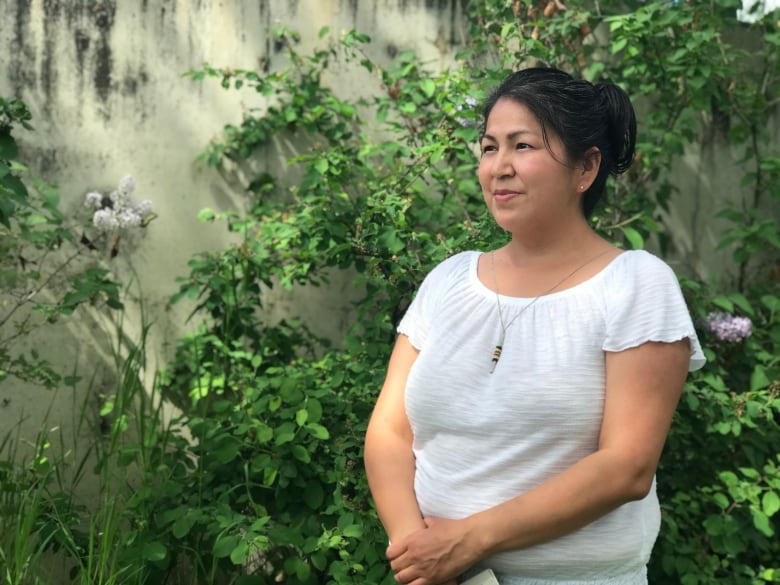Deh Gáh Got’îê First Nation Chief Joachim Bonnetrouge said elders have told him Dene don’t have much to celebrate when it comes to the 100th anniversary of Treaty 11, but he feels differently.

Since time immemorial, Dene would dance and sing on the banks of the Mackenzie River near what is now Fort Providence, N.W.T.
Dozens made the point to carry on these traditions on Sunday, on land they unknowingly surrendered 100 years before.
On June 24, 1921, a treaty party came to the region with the intention of convincing the Dene to sign Treaty 11, the last of Canada’s numbered treaties. The stop in Fort Providence was the first of eight that summer, as the party travelled down the Mackenzie River.

The treaty covers 950,000 square kilometres of the western N.W.T. from Fort Providence to the Arctic Ocean, and includes corners of Yukon and Nunavut.
- IN DEPTH | 100 years on, Treaty 11 is a symbol of both sovereignty and dispossession
‘That’s when everything changed’
The Crown’s interest in the region skyrocketed in 1920, after oil was discovered in Fort Norman, now Tulita, N.W.T.
At that first treaty signing in Fort Providence, the Dene elected Paul Lefoin, a skilled hunter, to speak to the treaty party on their behalf. Lefoin refused to even touch the signing pencil for three days until Commissioner Henry Conroy promised to respect their hunting, fishing and trapping rights.

The Dene were convinced they had signed on to a treaty of peace and friendship — but that’s not how things turned out.
“[The ancestors] big concern was, of course, the land, the environment,” according to Joachim Bonnetrouge, chief of Deh Gáh Got’îê First Nation. “They were concerned about the changes that would come, and sure enough, it was true.”

The Treaty forced the Dene to “cede, release, surrender, and yield” all of their land rights to the Dominion of Canada. It also empowered the Crown to regulate their rights to fishing, hunting and trapping — despite telling them otherwise.
Elder Johnny Farcy’s grandfather, Harry Francis, was one of three original signatories of the Treaty.
Farcy remembers the signing as a turning point for his family.

“That’s when everything changed,” Farcy told CBC.
“Everyone moved to Fort Providence, so they left the bush life, and all the kids started going to school.”
The treaty also installed a chief and council system on the Dene people, Bonnetrouge continued.
“We kept being told the Queen and Canada wanted us to become faithful Canadians,” Bonnetrouge said.
“Even to this day, it’s still discomforting to get that kind of message because … it will affect who you are and what you do.”
‘There’s no turning back’
It’s this kind of history that Dene writer Karalyn Menicoche wants to bring to the young people of Deh Gáh Got’îê.
Her father, Chief Bonnetrouge, asked Menicoche to publish one of her university essays detailing the relationship of the Dene to Treaty 11 for the front page of a commemorative newspaper.

Next to the article is a drawing of the three ancestors who signed their treaty.
“Treaty 11 is a historic time for the Dene people, and it has grown into our culture in a profound way that there is no turning back,” Menicoche writes in her piece.
Menicoche said she wrote it for all the young people in her community that don’t know the history. She wants to teach them, she continued, because of the profound effect it has had on their people.
“There’s obligations that need to be met and recognized,” she said. “We need people to be accountable for what had happened that day, and the after effects.”
‘If you’re Canadian, you’re part of the treaty’
Leaders from across the N.W.T. are reflecting on the lasting legacy of the Treaty as part of commemorations this weekend.
Deneze Nakehk’o travelled to Fort Providence from Yellowknife, N.W.T., to attend. His family signed on to the treaty in Łı́ı́dlı̨́ı̨́ Kų́ę́, close to Fort Simpson, all those years ago.

The 100-year anniversary is significant for all Canadians, Nakehk’o said.
“If you’re Canadian, you’re part of the treaty,” Nakehk’o said. “And like any deal, both sides have their own responsibility to fulfill.
“It’s up to them to take that responsibility of their own, to try to learn and understand.”
Treaty 11 also informed modern treaty negotiations across the territory. Three major land claims were signed by the Sahtu, Gwich’in and Tłı̨chǫ in the mid-90s to early 2000s as a way to take back some control over their lands.
Negotiations for the modern treaty agreement for Nakehk’o’s people in Łı́ı́dlı̨́ı̨́ Kų́ę́, as well as in Providence, have been going on for the last 22 years.
‘We’re still here’
Bonnetrouge said he struggled to figure out how to commemorate this passing of time, whether the anniversary was more of a commemoration or a celebration.
Local elders told him they didn’t have much to celebrate, but he has a different perspective.
“We still have so much in our lives today,” he said. “Look at our beautiful river, the land, the culture. [It’s] still very strong.”

A century later, Bonnetrouge said there’s still a lot of “hard work” left to do so his people can live a freer life.
Part of that work, he continued, is reminding Canada and the rest of the world about the resiliency of the Dene people.
“We’re still here — in spite of all the not-really pleasant things that happened to us.”
